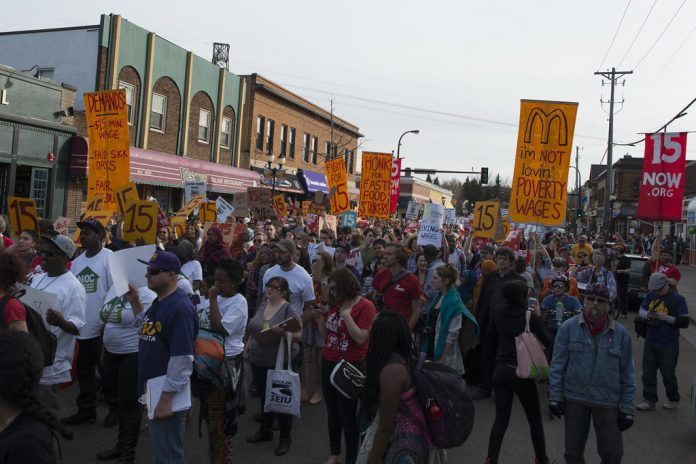By Dan McCaleb
A $15 minimum wage would result in 1.4 million jobs lost and disproportionately hurt younger workers and those with less education, a new Congressional Budget Office report says.
President Joe Biden, U.S. Sen. Bernie Sanders, and other Democrats have proposed raising the federal minimum wage to $15 an hour by 2025, more than double the current federal minimum of $7.25 an hour.
Biden says such a move would lift millions of Americans out of poverty. While the CBO confirms the poverty-reducing impact, it also says it would hurt the economy.
“In 2025, when the minimum wage reached $15 per hour, employment would be reduced by 1.4 million workers (or 0.9 percent), according to CBO’s average estimate,” the report says. … “Young, less educated people would account for a disproportionate share of those reductions in employment.”
The higher minimum wage also would result in increased prices for consumers, including on health care, and businesses would be on the hook for higher unemployment premiums because more out-of-work people would seek the benefit.
“Under the bill, Medicaid spending would increase because the effects of increases in the price of health care services and increases in enrollment by people who would be jobless as a result of the minimum-wage increase would outweigh the effects of decreases in enrollment by people with higher income,” according to the CBO. “Prices, such as those for long-term services and supports and medical services, would increase as a result of negotiations that accounted for higher costs of labor facing health care providers.”
Other ramifications of a $15 minimum wage, according to CBO, would be less investment by businesses.
“Some businesses would invest in capital goods to replace workers,” the report says. “Other businesses, however, would be discouraged from constructing new buildings or buying new machines if they anticipated having fewer employees to use them. On average, over the 2021–2031 period, real investment would be slightly lower than it would be if current laws did not change, CBO estimates. That reduction in investment would reduce workers’ productivity and lead to further reductions in their employment.”
The Georgia Center for Opportunity, which advocates for those in poverty through free-market solutions, said the negatives of such a large minimum wage hike outweigh any benefits.
“Workers need immediate help, but doubling the federal minimum wage when Georgia small businesses are closing left and right is not the right answer,” Buzz Brockway, GCO’s director of public policy, said in a statement. “Recent data have shown us that unilateral minimum wage hikes hurt low-income, low-skilled workers the most. What’s needed for low-income Georgia workers is more than a temporary fix: What’s needed is practical training and credentialing to help them ‘upskill’ into better-paying jobs and careers.”
Originally published by The Center Square. Republished with permission.











